MELBOURNE, Fla. – When it comes to her son’s education, Denice Santos always thinks about the big picture.
“What can we do to merge his goals?” she said. “Education, and then, of course, becoming a pilot.”
Her son, William, 12, has wanted to fly airplanes for half his life. He took control of a plane for the first time when he was 8. He’s nearly halfway to the required 51 hours of flight time needed to earn a pilot’s license.
A Florida education choice scholarship is helping him reach that goal.
William receives a Personalized Education Program (PEP) scholarship available through the Florida Tax Credit Scholarship Program managed by Step Up For Students. PEP provides parents with flexibility in how they spend their scholarship funds, allowing them to tailor their children’s learning to meet their needs and interests.

William Santos stands in front of a two-engine airplane that he has flown during his training flights.
For his needs, William attends Florida Virtual School, where he is a straight-A student.
For his interests, William heads to Melbourne Flight Training twice a month for flight lessons. Both are paid for with his PEP scholarship, with the flight lessons covered under enrichment courses.
“I’m not just thinking about right now, his education experience right now. I’m thinking long term,” Denice said. “What’s after school? What’s school building to?”
William said he is thinking about attending the United States Air Force Academy. Or maybe a career in law enforcement where he could put his flying skills to use. Border patrol? Possibly.
He’s recently developed an interest in flying helicopters, which could open another career avenue. The family lives in Melbourne Beach, located in Brevard County, and the Brevard County Sheriff's Office has an aviation unit with four helicopters.
He could also become a commercial pilot and fly for an airline or fly charters for a private company.
“The sky is the limit,” said Denice, who chuckled at her choice of words.
***
William was 6 when he attended the Cocoa Beach Air Show with his mother and father, Kevin. There were flying machines everywhere – F-22s and F-35s, F-16s and B-52s. They screamed overhead and rested majestically on the ground.
He was hooked.
When they were leaving, William said, “Mom, when I grow up, I’m going to be a pilot.”
“He’s always been super decisive,” Denice said. “I knew he wasn’t kidding.”
Denice checked for the minimum age requirement needed to begin flying lessons. Turns out, there is none. You do have to be between 8 and 17 to participate in the nationwide Young Eagles program, which offers free introductory rides for youngsters interested in flying. William was in the air as soon as he turned 8.
“They take kids up for 30 minutes with the pilot, and they get a little taste of it to see if they like it. Is this something? Are they afraid, or does it spark something? William did 10 of those, and we said, ‘OK, this is a thing.’”
Soon, Denice and Kevin were searching for a flight school. They settled on Melbourne Flight Training, which is 20 minutes from home.

William poses in front of the wall containing pictures of all the pilots who earned their license after training at Melbourne Flight Training.
“When I was a kid, I always liked planes,” William said. “Even when I would go on flights as a baby, I would never cry. I would love it, every minute. It was the best thing ever. And I was never really afraid of heights. It didn't bother me much.”
That’s good, because his first flight with Young Eagles was in a BushCat Light Sport Aircraft, a small plane that has non-traditional doors – they are clear plastic and can be removed. You can fly with or without them.
“It was kind of ever so slightly scary,” William said. “Since I was young, I was like, ‘Uh, am I sure about this?’ And many, many flights later, I'm here.”
He has flown 25 times with an instructor and has nearly 20 hours of flight time. He will need to turn 17 and have a minimum of 51 hours before he’s licensed. He will also need to be medically certified to fly and pass a written exam that covers weather, navigation, flight regulations, and aerodynamics.
Dr. Tracey Thompson, the student advisor at Melbourne Flight Training, said it’s not uncommon for someone as young as William to take lessons.
“But,” she added, “he’s been up 25 times, and for someone his age to be up that many times, that’s phenomenal. His consistency, his passion, he wants to do this all the time.”
Jonathan Gaume is William’s instructor. He said he’s never worked with a student this young and is impressed by William’s interest and enthusiasm.
While he’s on pace to reach his 51 hours when he’s 17, William would like to accelerate his training and reach those hours when he’s 16.
Why?
“Because I find this fun,” he said.
As for being one of the youngest pilots training at Melbourne Flight Training, “You know, it's been really the only thing I’ve done since I was 8. It’s been the thing I've always looked forward to.”
***
William has trained several times in a four-seat plane, and Denice has accompanied him during those flights. She said she’s noticed a level of peace when William is flying.
Gaume noticed it, too. He said William’s confidence spikes as they climb into the aircraft.
“He has key elements to being a good pilot: calm, confident and in control,” Gaume said.
The flight path takes William over the Atlantic Ocean, where they sometimes fly around thunderstorms. A recent lesson took place in a twin-engine plane. Gaume killed one of the engines, and William had to keep the plane flying. Confident and in control, William did just that.
“We’re just so thrilled, just so happy to plug him into his dream,” Danica said. “To be in the plane with him, seeing him flying, just seeing him totally locked in, that's all a parent can wish for.”
Flying lessons cost between $300 and $500 depending on airtime, and William averages about two lessons a month. That can strain the family budget for Denice, a teacher at Florida Virtual School, and Kevin, who is retired after 22 years in the U.S. Army.
“It’s not like we’re rolling in the dough,” Denice said. “The scholarship makes this possible. If we didn't have that scholarship, how many flights would he get? Probably not as many as he's getting now.
“I'm thrilled to be in Florida, because there's so much parental choice here. Not only do parents have choices, but then they can branch out and get some financial support from the state for those choices. Amazing. It's awesome.”
Every family in Florida that receives an education choice scholarship uses it in their own, unique way. Denice encourages parents to be as forward-thinking as possible, to merge education and interests and work toward a goal.
“I would like more people to think beyond where their kid is right now, but what are they good at. Really invest in that and tune in and give them the most experience as you can,” she said. “To me, that's what the scholarship money is for, branching out, tap into your kids’ interests because you never know what can happen.”
As Denice said, the sky is the limit.
By Ron Matus and Dava Cherry
Florida’s choice-driven education system is the most dynamic and diverse in America, but it’s facing new tests. This year, 41,000 Florida students were awarded school choice scholarships but never used them.
We wanted to know why, so we surveyed their parents.
The 2,739 who responded had a lot to tell us. Not only about supply-side challenges, but about the extent to which families are migrating between different types of schools, and their expectations for finding just the right ones.
As education choice takes root across America, we thought other states could learn from these parents, which is why we boiled their responses down into a new report, “Going With Plan B.”
We saw three main takeaways:
A third of the respondents (34.7%) said there were no available seats at the school they wanted. This, even though the number of Florida private schools has grown 31% over the past 10 years. Meanwhile, a fifth of the respondents (19.7%) said the scholarship amount wasn’t enough to cover tuition and fees.
Even without scholarships, a third of the respondents (36.5%) switched school types (like going from a traditional public school to a charter school). And between their child’s prior school and the school they ended up in, more experienced a positive rather negative shift in satisfaction (20.4% to 10.5%). We didn’t see that coming.
Two thirds of the respondents said they’d apply for the scholarships again, including 63% of those who switched school types, and 55.5% of those who were satisfied after doing so.
Things got better, it seems, but not better enough.
Perhaps as choice has grown, so too have parents’ expectations.
See the full report here.
Dava Cherry is the former director of enterprise data and research at Step Up For Students, and a former public school teacher.
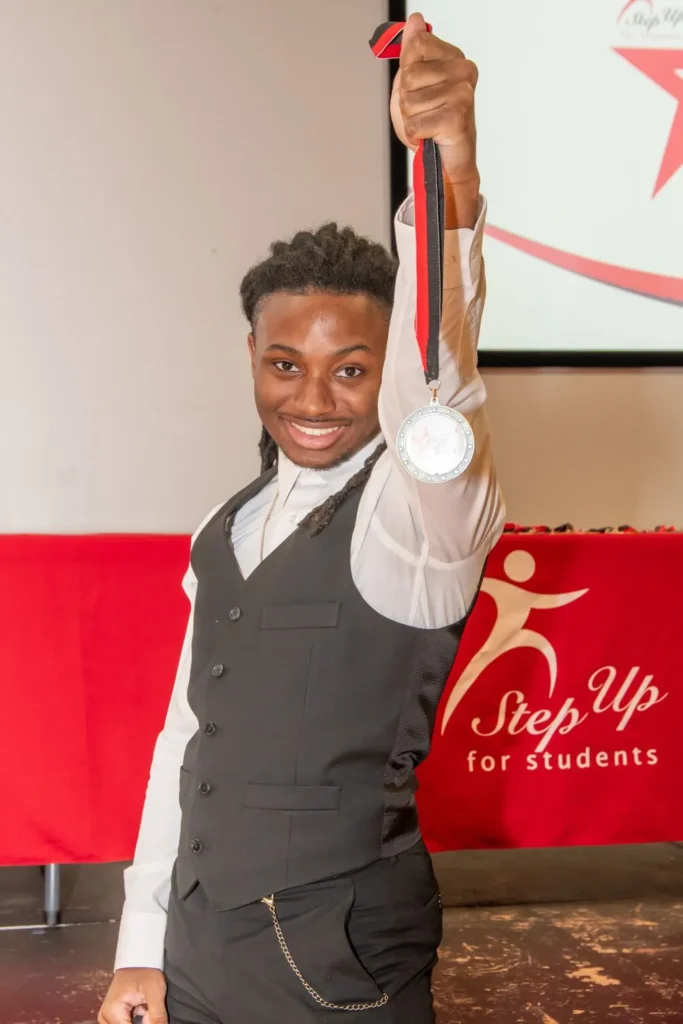
Ronald Hamilton shows off the medal he received at Step Up For Students' annual Rising Stars Awards event in February.
TAMPA, Fla. – The poem is a father’s message to his son, that everything they do together will be a memory someday.
"I’m going to love and hold you until you’re grown
for in a blink you'll be on your own."
Barbara Hamilton wrote the poem for her son, Ronald, when he was in the seventh grade. He recited it at the end-of-the-school-year celebration for homeschoolers. It’s based on Ronald’s interactions with his dad, Ron Sr. Everything the Hamiltons have done for their only son has been to prepare him for the time he will be off on his own, and that included his education.
Unhappy with his treatment by a classmate and what Barbara said was a lack of concern from administrators at his assigned district school near the family’s Tampa home, Barbara began homeschooling Ronald when he was in the second grade.
“Homeschooling wasn't good only for him, it was great for us because it exposed us to a totally different world and allowed us to think outside of the box,” Barbara said. “We don't have to go with the status quo. Yes, the government says your child must be educated, but there's another way you can do it.
“It just opened up a different world for us, and I have no regrets.”
Now a high school senior, Ronald, 17, uses a Personal Education Program (PEP) scholarship that comes with the Florida Tax Credit Scholarship (FTC), managed by Step Up For Students.
The scholarship is an education savings account (ESA) for students who are not enrolled full-time in a public or private school. It allows parents to customize their children’s education by allowing them to spend their scholarship funds on various approved, education-related expenses.
Barbara is thankful for the scholarship, which was created in time for the 2023-24 school year. But, like many parents who have homeschooled their children for years, she wishes it had been created a few years earlier.
“(Homeschooling) can pinch your wallet,” she said.
Yet, she is 100% confident that homeschooling was the right educational choice for Ronald. They tried traditional schools for kindergarten and first grade, but Ronald was bullied.
He also had a hearing impairment that went undetected until the fifth grade, when a homeschool evaluator raised her suspicion to Barbara. Barbara and Ron Sr. had suspected this for years, but doctors couldn’t find a defect. A hearing specialist in Colorado did, and Ronald now wears an ear filter that buffers loud sounds.
“Ronald’s hearing developed a little differently,” Barbara said. “Sound to him was extra loud. I noticed he covered his ears every time there was a loud noise.”
This made it difficult for Ronald to correctly hear what was being said in class. Barbara said the teacher, in a sign of indifference to Ronald’s struggle, moved his seat away from the other students, isolating him from his classmates, and adding to his trauma.
“He would come home, and his spirit would be downtrodden,” Barbara said. “So, I took it upon myself and pulled him out of that school. The Lord didn’t give him to you. He gave him to me, so I took the chance of educating him myself.
“We started on our journey, and it was peaceful. The house was happy. Ronald was happy.”
“Well,” Ronald said. “I'm going to be honest, it was kind of hard at times, but I got through it, and long term, it was actually beneficial.”
The hard times, Ronald said, came from the textbook Barbara initially used for her lessons. It was big and somewhat intimidating.
“It was gruesome,” Ronald said.
Barbara made the switch to Florida Virtual School. Ronald enjoyed the interaction with other homeschoolers. In the fifth grade, Ronald was introduced to the world of robotics.
“That motivated me to learn more about technology,” he said.
Ronald joined Tampa Bay HEAT (Homeschool Education Activities Team), where he met fellow homeschoolers and participated in sports and extracurricular activities.
He also became a member of a storytelling group in Hillsborough County. Barbara and Ron Sr. saw that as another step in their son’s development, because it allowed him to build the confidence that comes with speaking in front of groups.
So, when the Tampa Bay HEAT was looking for a student to speak at the end-of-year event, the coordinator, aware of Ronald’s storytelling ability, asked Ronald to be the guest speaker. After looking through family photos that reminded her of the interactions between Ron Sr. and Ronald, Barbara decided to write the poem, "A Father's Eyes."
“It dawned on me that Ronald is going to be mimicking with his children everything he does with his dad, and I was like, ‘Man, I need to capture that.’ So, I captured it,” Barbara said.
Ronald can still hear the reaction of those at the event.
“Everyone cheered,” he said.
And he can still recite some of the lines.
"Now, catch the ball. Run, jump, laugh, & play
for this will be a memory one day."
Ron Sr. said the extra time he spent with Ronald is one of the benefits of homeschooling. For the physical education requirement, Ron Sr. taught Ronald how to play golf and tennis. In their spare time, the two searched the ponds, lakes, and streams near their home for the perfect fishing spot.
“We haven’t found it yet,” Ronald said.
“I can say this,” Ron Sr. said, “the more time with his family gave us more time to teach him family values and the in-between things about school, how to live, how to treat other people.”
PEP allowed Ronald to dual enroll at Hillsborough Community College. He will explore further education options once he completes his liberal arts degree. Right now, Ronald is leaning toward a career as an electrician. Ron Sr. thinks his son will one day own his own business.
Ronald said it’s possible that he could start his own business as a side hustle.
“That way I’ll have active and passive income,” he said.
James Herbert, Ronald’s eighth-grade science teacher from the Florida Virtual School, wrote a recommendation for Ronald to receive the Super Senior Award at Step Up For Students’ annual Rising Star event.
He wrote that Ronald has an “exemplary work ethic,” “high moral character,” and is “driven to succeed.”
“I am confident Ronald will continue to uphold these values as he takes on new challenges and opportunities,” he wrote.
This is what the Hamiltons wanted when Barbara exercised her right to education choice and homeschooled Ronald.
"I’m amazed at whom you’ve become,
Simply viewing life from the eyes of my son."
This school year, 2024-2025, for the first time, Brevard County students using Florida’s education choice scholarship programs will have a new option: the ability to sign up for online courses offered by Brevard Virtual School.
Brevard Public Schools was the first countywide school district in Florida to offer courses to scholarship families through its virtual school. But more are sure to follow.
Florida law allows scholarship students to access services, including classes, from traditional public, virtual, or charter schools. However, families can’t choose this option if a school is not set up to accommodate it.
 The option has historically been underused. This is beginning to change, however, thanks to a growing interest in innovation among public -school leaders and people in their communities.
The option has historically been underused. This is beginning to change, however, thanks to a growing interest in innovation among public -school leaders and people in their communities.
On Brevard’s heels, the Glades County School District has begun making in-person classes available to scholarship students. Other school districts and charter school organizations are taking similar steps across the state.
History of blurred lines
In Florida, the boundaries between a public school district and the world of parent-directed learning outside the system have long been blurry.
Heather Price, the principal of Brevard Virtual School, has helped lead the charge to make classes available to scholarship families. “I have been immersed in the world of flexible learning since 2008 and am always looking for ways to improve and expand what we can offer to families”, she said.
Brevard Virtual School serves over 5,000 online students, enrolled in approximately 12,000 courses. Some use the virtual option full -time, while others use it to supplement classes at their local public schools. Homeschoolers can also sign up for individual courses.
During the 2023 Florida Legislative Session, House bill 1 passed, making parental involvement a priority. It made every family in the state eligible for an education choice scholarship. It also added a new flexible learning option to the mix: the Personalized Education Program (PEP), a scholarship specifically for students who do not attend school full-time.
The first year, the PEP scholarship was capped at 20,000 students. This school year, that cap tripled.
Price heard buzz among parents that many of her existing part-time students were signing up for scholarships.
She wanted to make sure her school was among the available options.
“We knew that our families who have been with us for many years would be the exact same families who would be interested in what the scholarship offers,” Price said. As a result: “We either need to get on board or we’re going to lose folks who love us, and who we love.”
A foundation of diverse online learning options
Florida Virtual School (FLVS) functions as a statewide school district and has offered publicly funded online classes since the late ‘90s. It has long offered classes to students using private school scholarships.
Florida school districts can create online schools that employ local teachers and use FLVS curriculum and technology. These district franchises provide local flavor and opportunities for in-person meetings, while the statewide FLVS option provides a broader selection of courses. It’s common for online students to take a few classes from each.
FLVS partners with school districts, such as Brevard Public Schools, to support the local franchises.
“It’s a local twist on a statewide program,” Price said. “I’m sitting here in an office. Families can come in and get help. They can participate in our local activities.”
Districts build new organizational muscles
Thanks to the state’s long history of virtual schooling, Florida school districts are used to receiving funding for online courses on a per-class basis.
When they sign up as a scholarship provider, they face a new challenge: rather than reporting students to the state for funding, they must invoice students through the scholarship platform.
This requires districts to ensure correct operational systems are in place, from data systems to reporting.
Price said working through the issues required collaboration from every department in the district office.
The virtual school was a logical starting point to start building those organizational muscles. It had a critical mass of scholarship students, and the logistics of adding online students were simpler than at a physical campus.
But the work may not end there.
Many scholarship families are used to participating in public-school sports or extracurricular activities using Florida’s Tim Tebow law. Some of these electives, like band or drama, have classes associated with them, and districts will want to receive funding for students who take those classes. Other students want access to one-off courses or services at their local public school, including AP classes, career education courses, or state assessments.
Over time, more public schools will come up with new ways to meet the needs of students using scholarships, tapping a new revenue stream and expanding learning opportunities for students.
“We want them to be able to have the best of both worlds,” Price said. “So, they’re a scholarship student, but there’s also a lot of good, cool stuff that public school districts do.”
She added: “We want them to be able to have that choice and flexibility in how they educate their kids while taking advantage of all the opportunities that are available.”
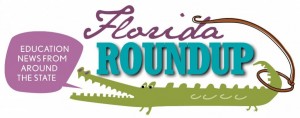
Miami-Dade: Miami educators in addition to literary and civil rights organizations gathered Tuesday to raise awareness about censorship and to offer a rebuttal to the recent decision to restrict four titles from elementary students in one Miami-Dade school. The event drew a crowd of about 300 community members, teachers and young children. Miami Herald.
Hillsborough: New principals were tapped to lead 10 schools in this county after the Hillsborough County School Board meeting. Some will start on Monday, and all should be in place by July 1. Tampa Bay Times. To make ends meet, some teachers in Hillsborough are working second jobs this summer. According to the National Center for Education Statistics, about 20% of teachers hold second jobs that make up about 9% of their income. Bay News 9. Perfect attendance rewards await students in this county. Seven students are receiving a $500 scholarship from Suncoast Credit Union Foundation, in addition to new laptops from Partners in Education, after not missing a day of school since kindergarten. WTSP. Meanwhile, educators in Hillsborough are now calling "social-emotional learning" something different. A redlined version of the student code of conduct, which the School Board unanimously approved on Tuesday, now uses terms such as "resiliency, character and life skills education" wherever "social emotional learning" was found before. Tampa Bay Times.
Sarasota: More than two dozen people offered opinions at the Sarasota County School Board meeting Tuesday on who the district's next leader should be as the search for a new superintendent nears a scheduled conclusion next week. The district has been searching for a new superintendent since the board moved last year to terminate the previous superintendent, Brennan Asplen. Sarasota Herald-Tribune.
Alachua: The school board here heard a preliminary report on grades 3-10 attendance, behavior and core academics on Tuesday. Board members expressed concern over the inequity the report didn't seem to address. Results are not yet processed fully, and grades K-2 were not ready for a preliminary report. Main Street Daily News.
Spelling bee champ: The Largo teen who won the 2023 Scripps National Spelling Bee arrived at the Tampa International Airport on Tuesday evening. Friends and teachers waited for Dev Shah, 14, to arrive home after he caught a flight from Tampa to New York, where he rang the closing bell on the NASDAQ exchange and made an appearance on "Live with Kelly & Mark." "I do appreciate the surprise and it was very welcoming and warm just to know everyone was here," he said. Shah was named champion of the bee on June 1, winning a trophy and a $50,000 prize. Shah will be a freshman at Largo High in the fall. ABC Action News. Tampa Bay Times.
Moms for Liberty: Florida-based Moms for Liberty has taken steps against what they consider liberal indoctrination in schools. Now, the Southern Poverty Law Center has deemed Moms for Liberty, along with 11 others, as "anti-government extremist" groups. “These groups publicize their fight for alleged parents’ rights while simply attempting to maintain absolute authority on issues they oppose,” the Southern Poverty Law Center stated. Moms for Liberty did not comment on the report. Tampa Bay Times.
Virtual school: Florida Virtual School has paused hiring and is taking other cautious financial measures amid a drop in full-time students completing courses over the past year. Course completion is a key metric for the school, which only gets paid if students finish online classes. There was a significant influx of enrollment in recent years that was driven by the pivot to online learning during the pandemic, decreasing the number of students completing courses. Orlando Sentinel.
Turkey list: Florida Tax Watch included millions of dollars worth of education projects on its annual "turkey" list as Gov. Ron DeSantis examines the state's budget for line-item votes. Florida Phoenix.
University and college news: For the first time in 13 years, Daytona State College is looking at a fee increase. The school issued a news release announcing that tuition is expected to remain at the same level it has been since 2011, but that increased costs are driving the need to raise fees. The Daytona Beach News-Journal.
Opinions on schools: School choice means options in addition to opportunity. It also packs daunting responsibility for parents who want to do what's best for their offspring, but are uncertain about where to turn. Tom Jackson, reimaginED.
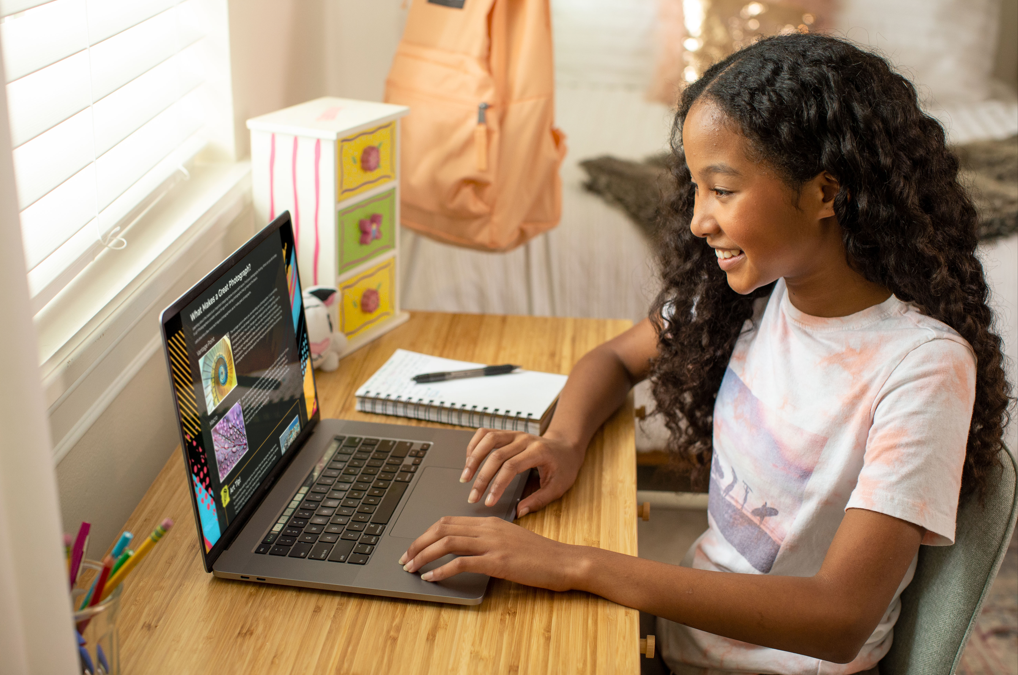
A new offering from Florida Virtual School, Artificial Intelligence in the World, will guide students through the concepts, tools, and building blocks of artificial intelligence and provide them with a broad overview of how AI is used in decision-making and problem-solving worldwide.
On this episode, reimaginED senior writer Lisa Buie talks with Amy Heflin, senior manager for STEM curriculum at Florida Virtual School. Heflin discusses a new high school course program in artificial intelligence and how it will offer students a foundational knowledge of AI and its applications.
Her interview comes a day after FLVS, the nation’s first statewide internet-based virtual school, unveiled its first course, AI in the World, which is part of a progression of industry-focused classes that also include courses in hospitality and entrepreneurship.
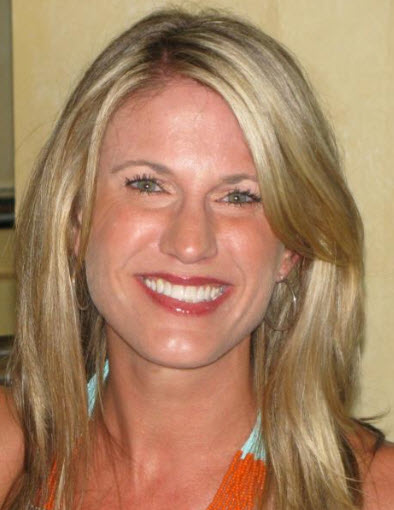
Amy Heflin
“We try to impress upon students that studying AI requires analytical, critical thinking skills, things that we use on a daily basis, and that can be useful in any field. Learning about AI will help students develop their problem-solving abilities. They'll become better equipped to handle complex issues.”
EPIDOSE DETAILS:
Topics and hands-on activities covered in the course
The types of students for whom the course is designed
The role that University of Florida faculty members played in developing the curriculum
How the course fits into FLVS’s overall computer science program, which includes a new AP computer science principles course
Heflin’s desire to help students embrace AI rather than fear it
A sneak peek at the next AI course, Applications for Artificial Intelligence
RELEVANT LINKS:
Florida Department of Education among first to adopt K-12 AI education program
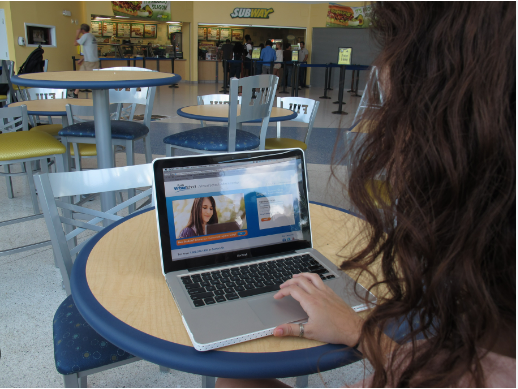
When the coronavirus pandemic hit in 2020, Florida Virtual School came to the rescue of students beyond those in the Sunshine State, jumping at the opportunity to partner with more than 160 new schools and districts. One of the world’s leading online learning providers, FLVS now serves more than 240,000 students.
Editor’s note: This article appeared Monday on the74million.org.
Kristy Maxwell realized something had to change the day she picked her son Levi up from school and found out his teacher had left the autistic kindergartener alone crying and throwing pencils from under his desk.
The Michigan mom switched her son to a school that had a good reputation serving students with disabilities, but things didn’t improve. Because Levi was a “math whiz,” staff ignored his trouble socializing and his difficulty handling the cafeteria’s loud noises, Maxwell said.
Meanwhile, she was unsuccessful in lobbying the school to screen her child for autism, a way to secure the extra services required by law for students with disabilities. The mother worried her son might never get the learning support he needed.
Then, in March 2020, the pandemic shifted all classes at his school online and forced the family into an accidental experiment in a new model of education.
During remote school, Levi could get one-on-one attention sitting next to his mother, who had to temporarily stop her work as a massage therapist due to COVID. His younger sister, who struggles with anxiety, could take breaks to pet the family’s dogs.
“When everything shut down and we were forced to go virtual … my two younger kids did really well,” Maxwell said. “We decided after doing that, since the younger two kids did so well outside of a brick-and-mortar [school], keeping them virtual would be the best way to help them academically.”
The Maxwells, whose three kids are now 9, 11 and 15, are among the thousands of families across the U.S. that tried virtual learning for the first time during the pandemic and are now staying with it.
New data indicate that online schools have had a staying power beyond the pandemic that few observers suspected. While some virtual academies have operated for decades, they saw a well-documented enrollment explosion in 2020-21, the first full school year after COVID, as many virus-wary parents looked to protect their children from infections and anti-mask families sought a way out of face-covering requirements.
But in the following year, even as brick-and-mortar schools fully reopened and mask mandates fell, remote schools mostly maintained their pandemic enrollment gains — and in many cases added new seats.
To continue reading, click here.